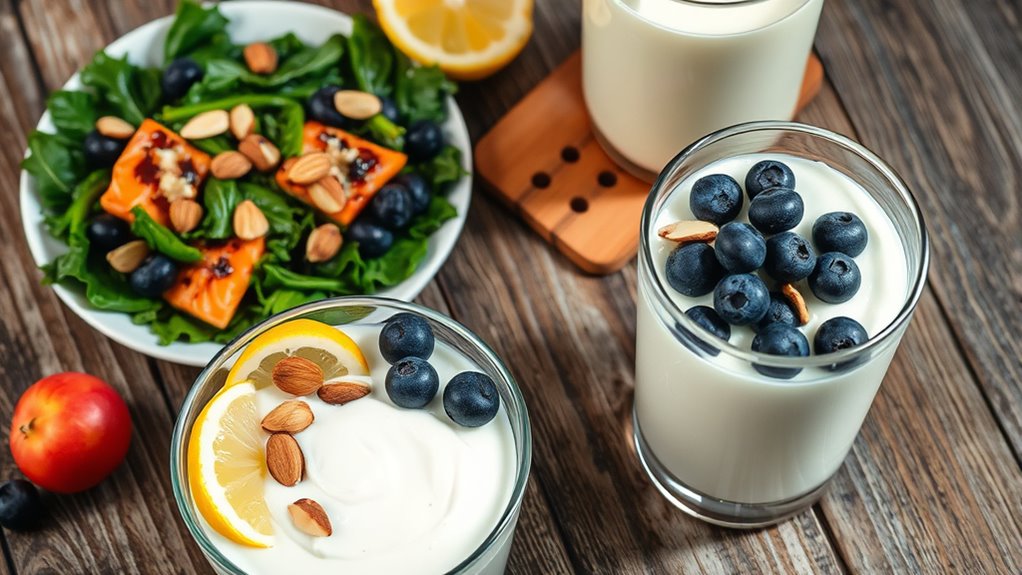To boost your bone density, focus on eating calcium-rich foods like dairy and leafy greens, along with vitamin D sources such as fatty fish and fortified products. Make sure to get about 15 minutes of sunlight daily to help your body produce vitamin D naturally. Incorporate magnesium, phosphorus, and vitamin K from a balanced diet, limit processed foods, and stay active. Keep exploring to discover more targeted strategies that can truly support your bone health.
Key Takeaways
- Consume calcium-rich foods like dairy, leafy greens, and fortified products to support bone mineralization.
- Ensure adequate vitamin D intake through sunlight, diet, or supplements to enhance calcium absorption.
- Include magnesium, phosphorus, and vitamin K in your diet for overall bone health and strength.
- Limit processed foods and sugary drinks that can leach minerals from bones.
- Engage in regular weight-bearing exercise to promote bone density alongside proper nutrition.

Maintaining strong bones requires more than just regular exercise; your diet plays a crucial role in supporting bone density. To keep your bones robust, you need to focus on nutrients that promote calcium absorption and vitamin D synthesis. Calcium is the primary mineral responsible for bone strength, but without adequate vitamin D, your body struggles to absorb calcium efficiently. Ensuring your diet includes foods rich in calcium, such as dairy products, leafy greens, and fortified foods, is essential. However, consuming calcium alone isn’t enough—your body needs vitamin D to maximize calcium absorption. Sunlight exposure naturally stimulates vitamin D synthesis in your skin, but dietary sources like fatty fish, egg yolks, and fortified foods also contribute. If you’re not getting enough sun, consider including vitamin D-rich foods or supplements to support this process.
Your body’s ability to absorb calcium depends heavily on vitamin D levels. When you consume calcium-rich foods, vitamin D activates proteins in your intestines that facilitate calcium uptake into your bloodstream. Without sufficient vitamin D, calcium absorption drops noticeably, putting your bones at risk of becoming weak and brittle over time. To enhance this process, aim for regular sun exposure—about 15 minutes a day on your arms and face—while balancing skin safety. In addition, incorporate foods fortified with vitamin D, such as certain cereals and dairy products, into your diet. If you find it difficult to get enough vitamin D from food and sunlight, supplements can be a practical way to maintain ideal levels. Just be sure to consult with a healthcare provider to determine the right dosage for you.
Another critical aspect is maintaining an overall balanced diet that supports bone health. Adequate intake of magnesium, phosphorus, and vitamin K also helps strengthen bones by working in tandem with calcium and vitamin D. For instance, magnesium aids in converting vitamin D into its active form, which further enhances calcium absorption. Leafy greens like kale and spinach contain both magnesium and vitamin K, making them excellent choices to support bone density. Avoid excessive consumption of processed foods and sugary drinks, as they can leach minerals from your bones and impair overall bone health. Staying well-hydrated and limiting alcohol intake are additional steps you can take to preserve bone strength.
Frequently Asked Questions
Can Supplements Replace a Balanced Diet for Bone Health?
Supplements can’t fully replace a balanced diet for maintaining bone health. While supplement efficacy varies, relying solely on them risks missing essential nutrients found in whole foods. You need dietary balance to get a wide range of vitamins and minerals that support strong bones. Supplements can help fill gaps, but they shouldn’t be your primary source. Focus on nourishing your body with nutrient-rich foods to truly promote ideal bone density.
How Does Alcohol Consumption Affect Bone Density?
Alcohol’s impact on bone density can be quite harmful. When you consume alcohol excessively, it interferes with your body’s ability to absorb calcium, essential for strong bones. This leads to bone degradation over time, increasing your risk of fractures and osteoporosis. You might not realize it, but reducing alcohol intake helps preserve your bone health, allowing your body to maintain proper bone density and strength for the long term.
Are There Specific Foods to Avoid for Stronger Bones?
Think of your bones as a house needing strong bricks. To keep them sturdy, avoid dairy restrictions that limit calcium intake and stay away from high sodium foods, which are like water eroding the foundation. These choices can weaken your bones over time. Instead, focus on calcium-rich foods and limit salt to support your bone health. Your bones will thank you for the care!
What Is the Role of Vitamin D in Calcium Absorption?
Vitamin D plays a vital role in calcium regulation by enhancing your body’s ability to absorb calcium from food. When sunlight triggers your skin’s vitamin D synthesis, it helps maintain healthy calcium levels essential for strong bones. Without enough vitamin D, your body struggles to absorb calcium efficiently, increasing the risk of weakened bones. Consequently, ensuring adequate vitamin D intake supports ideal calcium absorption and promotes bone health.
How Does Age Influence Nutritional Needs for Bone Health?
Ever wondered how aging bones affect your nutritional needs? As you age, your bones become less dense, increasing the importance of nutrient absorption. You need more calcium, vitamin D, and other essential nutrients to maintain bone strength. Do you realize that your body’s ability to absorb nutrients declines with age? To support healthy bones, prioritize nutrient-rich foods and consider supplements if necessary, ensuring your bones stay strong throughout your life.
Conclusion
By embracing these nutritional strategies, you’re shaping a fortress of strength within your bones, much like the steadfast stones of ancient castles. Every calcium-rich bite and vitamin D boost adds another brick to your foundation, ensuring resilience against time’s wear. Remember, your bones are the silent guardians of your mobility—nurture them wisely, and they’ll stand tall and unwavering, echoing the timeless endurance of legends carved in stone.









